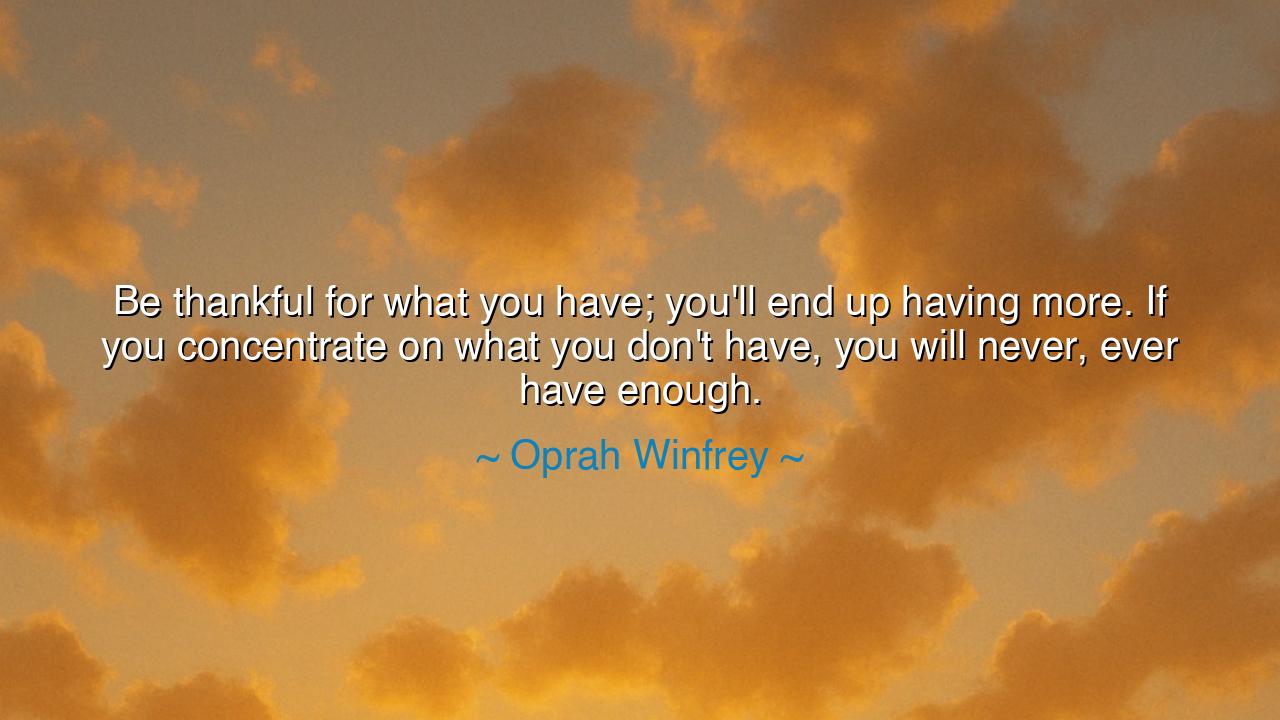
Be thankful for what you have; you'll end up having more. If you
Be thankful for what you have; you'll end up having more. If you concentrate on what you don't have, you will never, ever have enough.






Hear the words of Oprah Winfrey, a woman who rose from hardship to become a voice of influence in the world: “Be thankful for what you have; you’ll end up having more. If you concentrate on what you don’t have, you will never, ever have enough.” These words are not the idle musings of luxury but the distilled wisdom of one who has walked the valley of want and ascended to the mountaintop of abundance. Her saying strikes the heart like a bell: gratitude multiplies, while discontent devours.
The first jewel in her words is the command to be thankful for what you have. Gratitude is not merely an emotion—it is an orientation of the soul. To live with thankfulness is to see life not as deprivation, but as blessing; not as scarcity, but as gift. What you already possess—your breath, your mind, your relationships, your daily bread—is the foundation of wealth. When you honor what is in your hands, the world itself seems to expand, and abundance flows from unexpected places.
The second flame in her teaching is the paradox of having more through gratitude. How can this be? Gratitude does not magically summon riches, but it changes the eye of the heart. The thankful soul sees opportunity where others see emptiness, sees blessings where others see burdens. Thus, even without new possessions, the grateful person lives in wealth, for every small gift becomes treasure. And in time, such a spirit often draws even greater blessings, for those who honor little are entrusted with more.
The third truth is her warning: “If you concentrate on what you don’t have, you will never, ever have enough.” This is the curse of envy and comparison, the endless hunger that blinds the soul. Those who fixate on what is missing will never taste satisfaction, no matter how much they gain. For desire without gratitude is a bottomless vessel, forever emptying, never filling. To live this way is to walk a desert with no oasis, thirsty even while standing beside a river.
History gives us a mirror in the tale of King Midas. Blessed with wealth, he desired more and prayed that all he touched be turned to gold. His wish was granted, yet it became his curse, for even food and loved ones turned lifeless at his touch. Though he had gained immeasurable riches, he had nothing. Midas’s folly was that he looked only at what he lacked, never giving thanks for what he had. His story echoes Winfrey’s wisdom: without gratitude, you can never, ever have enough.
The fourth jewel is the recognition that gratitude is freedom. It liberates the heart from comparison, from the endless pursuit of more, and anchors it in the present. A thankful spirit dwells in peace, because it no longer measures life by what is missing, but by what has already been bestowed. In this way, gratitude is the cure for envy, the shield against despair, and the wellspring of joy.
The lesson for us is clear: choose gratitude daily. Give thanks for the small mercies—the morning light, the laughter of a child, the strength of your body, the lessons of hardship. Resist the temptation to measure your life by what others have or what you still lack. In doing so, you will not only find satisfaction, but you will discover that your life is richer than you ever imagined.
Practically, begin each day by naming three things for which you are thankful. When envy whispers, silence it with gratitude. When you long for what you do not yet have, pause and bless what is already in your grasp. For as Oprah teaches, the thankful will always live in abundance, while the ungrateful will remain impoverished, even in plenty. Be thankful, and you will have more; focus on lack, and you will never have enough.






AAdministratorAdministrator
Welcome, honored guests. Please leave a comment, we will respond soon